- Home
- Carlos Ruiz Zafón
The Prisoner of Heaven
The Prisoner of Heaven Read online
Contents
Cover
Title Page
The Cemetery of Forgotten Books
Epigraph
Part One: A Christmas Story
Chapter 1
Chapter 2
Chapter 3
Chapter 4
Chapter 5
Chapter 6
Chapter 7
Chapter 8
Chapter 9
Chapter 10
Chapter 11
Chapter 12
Part Two: From Among the Dead
Chapter 1
Chapter 2
Chapter 3
Chapter 4
Chapter 5
Chapter 6
Chapter 7
Chapter 8
Chapter 9
Chapter 10
Chapter 11
Chapter 12
Chapter 13
Chapter 14
Chapter 15
Chapter 16
Chapter 17
Chapter 18
Chapter 19
Chapter 20
Chapter 21
Chapter 22
Chapter 23
Chapter 24
Part Three: Reborn
Chapter 1
Chapter 2
Chapter 3
Chapter 4
Chapter 5
Chapter 6
Chapter 7
Chapter 8
Chapter 9
Chapter 10
Chapter 11
Chapter 12
Chapter 13
Part Four: Suspicion
Chapter 1
Chapter 2
Chapter 3
Chapter 4
Chapter 5
Chapter 6
Chapter 7
Chapter 8
Chapter 9
Chapter 10
Chapter 11
Chapter 12
Chapter 13
Part Five: The Name of the Hero
Chapter 1
Chapter 2
Chapter 3
Chapter 4
Chapter 5
Chapter 6
Chapter 7
Chapter 8
Chapter 9
Epilogue: 1960
About the Author
Also by Carlos Ruiz Zafón
Copyright
THE CEMETERY OF FORGOTTEN BOOKS
The Prisoner of Heaven is part of a cycle of novels set in the literary universe of the Cemetery of Forgotten Books of which The Shadow of the Wind and The Angel’s Game are the two first instalments. Although each work within the cycle presents an independent, self-contained tale, they are all connected through characters and storylines, creating thematic and narrative links.
Each individual instalment in the Cemetery of Forgotten Books series can be read in any order, enabling the reader to explore the labyrinth of stories along different paths which, when woven together, lead into the heart of the narrative.
I have always known that one day I would return to these streets to tell the story of the man who lost his soul and his name among the shadows of a Barcelona trapped in a time of ashes and silence. These are pages written in the flames of the city of the damned, words etched in fire on the memory of the one who returned from among the dead with a promise nailed to his heart and a curse upon his head. The curtain rises, the audience falls silent and before the shadow lingering over their destiny descends upon the set, a chorus of pure souls takes the stage with a comedy in their hands and the blessed innocence of those who, believing the third act to be the last, wish to spin a Christmas story – unaware that once the last page is turned, the poison of its words will drag them slowly but inexorably towards the heart of darkness.
Julián Carax
The Prisoner of Heaven
(Éditions de la Lumière, Paris, 1992)
Part One
A Christmas Story
1
Barcelona, December 1957
That year at Christmas time, every morning dawned laced with frost under leaden skies. A bluish hue tinged the city and people walked by, wrapped up to their ears and drawing lines of vapour with their breath in the cold air. Very few stopped to gaze at the shop window of Sempere & Sons; fewer still ventured inside to ask for that lost book that had been waiting for them all their lives and whose sale, poetic fancies aside, would have contributed to shoring up the bookshop’s ailing finances.
‘I think today will be the day. Today our luck will change,’ I proclaimed on the wings of the first coffee of the day, pure optimism in a liquid state.
My father, who had been battling with the ledger since eight o’clock that morning, twiddling his pencil and rubber, looked up from the counter and eyed the procession of elusive clients disappearing down the street.
‘May heaven hear you, Daniel, because at this rate, if we don’t make up our losses over the Christmas season, we won’t even be able to pay the electricity bill in January. We’re going to have to do something.’
‘Fermín had an idea yesterday,’ I offered. ‘He thinks it’s a brilliant plan that’ll save the bookshop from imminent bankruptcy.’
‘Lord help us.’
I quoted Fermín, word for word:
‘Perhaps if by chance I was seen arranging the shop window in my underpants, some lady in need of strong literary emotions would be drawn in and inspired to part with a bit of hard cash. According to expert opinion, the future of literature depends on women and as God is my witness the female is yet to be born who can resist the primal allure of this stupendous physique,’ I recited.
I heard my father’s pencil fall to the floor behind me and I turned round.
‘So saith Fermín,’ I added.
I thought my father would smile at Fermín’s plea, but when I noticed that he remained silent, I sneaked a glance at him. Not only did Sempere senior not appear to find the suggestion the least bit funny, but he had adopted a pensive expression, as if he were seriously considering it.
‘Well, well … perhaps Fermín has unexpectedly hit the nail on the head,’ he murmured.
I looked at him in disbelief. Maybe the customer drought that had struck in the last few weeks was finally affecting my father’s good judgement.
‘Don’t tell me you’re going to allow him to wander around the bookshop in his Y-fronts.’
‘No, of course not. It’s about the shop window. Now that you’ve mentioned it, it’s given me an idea … We may still be in time to save our Christmas after all.’
He disappeared into the back room, then emerged sporting his official winter uniform: the same coat, scarf and hat I remembered him wearing since I was a child. Bea suspected that my father hadn’t bought any new clothes since 1942 and everything seemed to indicate that my wife was right. As he slipped on his gloves, my father smiled absently, his eyes twinkling with almost childlike excitement, a look that only momentous tasks managed to bring out in him.
‘I’ll leave you on your own for a while,’ he announced. ‘I’m going out to do an errand.’
‘May I ask where you’re going?’
My father winked at me.
‘It’s a surprise. You’ll see.’
I followed him to the door and saw him set off at a brisk pace towards Puerta del Ángel, one more figure in the grey tide of pedestrians advancing through another long winter of shadows and ashes.
2
Making the most of the fact that I’d been left alone, I decided to turn on the radio and enjoy a bit of music while I reorganised the collections on the shelves to my liking. My father argued that to have the radio on when there were customers in the shop was in bad taste and if I turned it on when Fermín was around, he’d start to hum on the back of any melody,
or even worse, given a chance he’d start swaying to what he called ‘sensual Caribbean rhythms’ and after a few minutes he’d get on my nerves. Taking those practical difficulties into account, I’d come to the conclusion that I should limit my enjoyment of the radio waves to the rare moments when there was nobody else in the shop but me and thousands of books.
That morning, Radio Barcelona was broadcasting a rare recording of a fabulous Louis Armstrong concert – made when the trumpeter and his band had played at the Hotel Windsor Palace on Avenida Diagonal, three Christmases earlier. During the publicity breaks, the presenter insisted on labelling that music as chass, with the warning that some of its suggestive syncopations might not be suitable for pious Spanish listeners brought up on the popular tonadillas and boleros that ruled the airwaves.
Fermín was in the habit of saying that if Don Isaac Albéniz had been born black, jazz would have been invented in the village of Camprodón, near the Pyrenees. That glorious sound, he said, was one of the precious few true achievements of the twentieth century along with the pointed bras worn by his adored Kim Novak in some of the films we saw at the Fémina Cinema matinees. I wasn’t going to argue with that. I let the remainder of the morning drift by between the alchemy of the music and the perfume of books, savouring the satisfaction that comes from a simple task well done.
Fermín had taken the morning off to finalise preparations for his wedding with Bernarda, due to take place at the beginning of February, or so he said. The first time he’d brought up the subject, barely two weeks earlier, we’d all told him he was rushing into it and that too much haste would lead him nowhere fast. My father tried to persuade him to postpone the event for at least two or three months, arguing that weddings were always best in the summer when the weather was good. But Fermín had insisted on sticking to his date, alleging that, being a specimen weathered in the harsh, dry airs of the Extremadura hills, he was prone to break into profuse perspiration during the Mediterranean summer, a semi-tropical affair in his estimation, and didn’t deem it appropriate to celebrate his nuptials flashing sweat stains the size of pancakes under his armpits.
I was beginning to think that something odd must be happening to Fermín Romero de Torres – proud standard-bearer of civil resistance against the Holy Mother Church, banks and good manners in that pious 1950s Spain so given to religious services and propaganda newsreels – for him to display such urgency for tying the knot. In his pre-matrimonial zeal he’d even befriended Don Jacobo, the new parish priest at the church of Santa Ana, who was blessed with a relaxed ideology and the manners of a retired boxer. Fermín had infected him with his boundless passion for dominoes and together they staged epic matches at the Bar Admiral on Sundays after mass. Don Jacobo would laugh his head off when my friend asked him, between glasses of fine liqueurs, if he had it from a higher source that nuns actually had thighs, and if that were the case, were they as soft and nibbly as he’d been suspecting since adolescence?
‘You’ll manage to get that priest excommunicated,’ my father scolded him. ‘Nuns are not to be looked at, or touched.’
‘But the reverend is almost more of a rogue than I am,’ Fermín protested. ‘If it weren’t for the uniform …’
I was recalling that conversation and humming to the sound of Maestro Armstrong’s trumpet when I heard the soft tinkle of the doorbell and looked up, expecting to see my father returning from his secret mission, or Fermín ready to start the afternoon shift.
‘Good morning,’ came a deep, broken voice from the doorway.
3
Cast against the light from the street, the silhouette resembled a tree trunk lashed by the wind. The visitor sported a dark, old-fashioned suit and presented a grim figure as he leaned on his walking stick. He took one step forward, limping visibly. The light from the small lamp on the counter revealed a face lined by age and the unmistakable trace of misfortune. The man stared at me for a few moments, sizing me up unhurriedly. He had the cold eyes of a bird of prey, patient and calculating.
‘Are you Señor Sempere?’
‘I’m Daniel. Señor Sempere is my father, but he’s not in right now. Is there anything I can help you with?’
The visitor ignored my question and began to wander around the bookshop examining everything in detail with almost covetous interest. The limp affecting him suggested that the wounds concealed beneath those clothes must have been quite severe.
‘Souvenirs from the war,’ said the stranger, as if he’d read my thoughts.
I kept my eyes on him, following his inspection tour through the bookshop, suspecting where he was going to drop anchor. Just as I’d imagined, he stopped in front of the ebony and glass cabinet, a relic dating back to the shop’s origin in 1888 when Great-grandfather Sempere, then a young man recently arrived from his fortune-seeking adventures in the Americas, had borrowed some money to buy an old glove shop and turn it into a bookshop. That cabinet, crown jewel of the shop, was reserved for the most valuable items.
The visitor drew close enough to the cabinet for his breath to leave a trail on the glass. He pulled out a pair of spectacles, put them on and proceeded to study the contents. His expression made me think of a weasel examining freshly laid eggs in a chicken coop.
‘Beautiful piece,’ he murmured. ‘Looks pricey.’
‘A family heirloom. Its value is mostly sentimental,’ I replied, feeling uncomfortable at the assessments of that peculiar customer whose gaze seemed bent on costing even the air we were breathing.
After a while he put his spectacles away and spoke in a measured tone.
‘I understand that a gentleman, well known for his wit, works for you.’
When I didn’t reply immediately, he turned round and threw me a withering look.
‘As you can see, I’m on my own. Perhaps, sir, if you would kindly tell me what book you’re after, I could try to find you a copy, with pleasure.’
The stranger granted me a smile that was anything but friendly and then nodded.
‘I see you have a copy of The Count of Monte Cristo in that cabinet.’
He wasn’t the first customer to notice the book. I gave him the official sales patter we reserved for such occasions.
‘The gentleman has a very good eye. It’s a magnificent edition, numbered and with illustrations by Arthur Rackham. It belonged to the private library of an important collector in Madrid. A unique piece, and catalogued.’
The visitor listened without interest, focusing his attention on the consistency of the ebony shelves and making it clear that my words bored him.
‘All books look the same to me, but I like the blue on that cover,’ he replied in a scornful tone. ‘I’ll take it.’
Under other circumstances I would have jumped for joy at the thought of being able to sell what was probably the most expensive book in the entire shop, but the thought that it should end up in the hands of that character made my stomach turn. Something told me that if that volume left the bookshop, nobody would ever bother to read even the first paragraph.
‘It’s a very costly edition. If you like, sir, I can show you other editions of the same work in perfect condition and at much more reasonable prices.’
People with a meagre soul always try to make others feel small too, and the stranger, who could probably conceal his on the head of a pin, gave me his most disdainful look.
‘And with blue covers too,’ I added.
He ignored the impertinence of my irony.
‘No, thank you. This is the one I want. I don’t care about the price.’
I agreed reluctantly and walked over to the cabinet. As I pulled out the key and opened the glass door, I could feel the stranger’s eyes piercing my back.
‘Good things are always under lock and key,’ he muttered under his breath.
I took the book and sighed.
‘Is the gentleman a collector?’
‘I suppose you could call me that. But not of books.’
I turned round with the book
in my hand.
‘And what do you collect, sir?’
Once again, the stranger ignored my question and stretched a hand out for the book. I had to resist the urge to put the volume back in the cabinet and turn the key. My father would never forgive me if I let such a sale go by when business was so bad.
‘The price is three hundred and fifty pesetas,’ I said before handing it to him, hoping the figure would make him change his mind.
He nodded without batting an eyelid and pulled out a one-thousand-peseta note from the pocket of a suit that cannot have been worth a duro. I wondered whether the note was forged.
‘I’m afraid I don’t have change for such a large note, sir.’
I would have asked him to wait a moment while I ran down to the nearest bank for change and, at the same time, to make sure it wasn’t a fake, but I didn’t want to leave him alone in the bookshop.
‘Don’t worry. It’s genuine. Do you know how you can tell?’
The stranger raised the note against the light.
‘Look at the watermarks. And these lines. The texture …’
‘Is the gentleman an expert in forgeries?’
‘In this world, everything is a fake, young man. Everything except money.’
He placed the note in my hand and closed my fist over it, patting my knuckles.
‘Keep the change for my next visit,’ he said. ‘On account.’
‘It’s a lot of money, sir. Six hundred and fifty pesetas …’
‘Loose change.’
‘Let me give you a receipt then.’
‘I trust you.’
The stranger examined the book without interest.
‘By the way, it’s a gift. I’m going to ask you to deliver it in person.’
For a moment, I hesitated.
‘We don’t normally do deliveries, but in this case we’ll be happy to take care of your package, free of charge. May I ask whether the address is in Barcelona itself or …?’
‘It’s right here,’ he said.
His icy look seemed to betray years of anger and resentment.
‘Would you like to include a dedication, or add a personal note before I wrap the book up, sir?’
The visitor opened the book at the title page with some difficulty. I noticed then that his left hand was artificial, made of painted porcelain. He pulled out a fountain pen and wrote a few words. Then he gave the book back to me and turned to leave. I watched him as he hobbled towards the door.

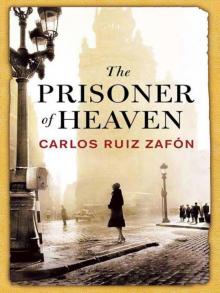 The Prisoner of Heaven
The Prisoner of Heaven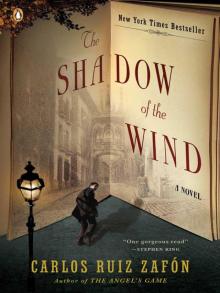 The Shadow of the Wind
The Shadow of the Wind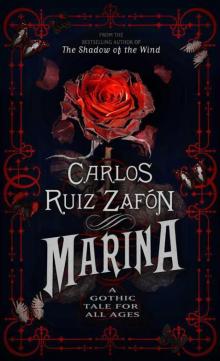 Marina
Marina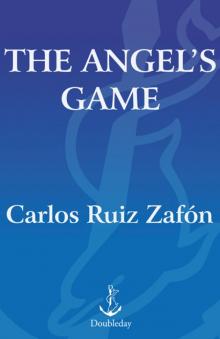 The Angel's Game
The Angel's Game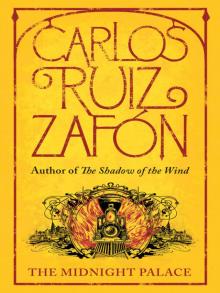 The Midnight Palace
The Midnight Palace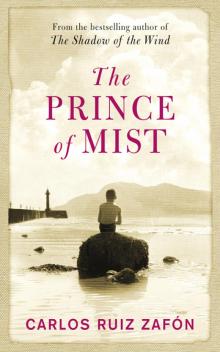 The Prince of Mist
The Prince of Mist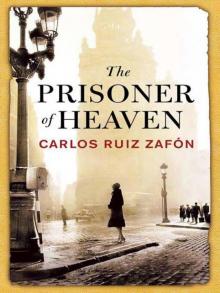 The Prisoner of Heaven: A Novel
The Prisoner of Heaven: A Novel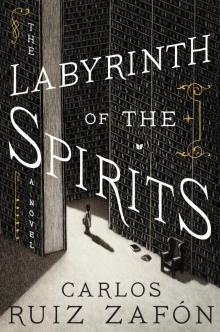 The Labyrinth of the Spirits
The Labyrinth of the Spirits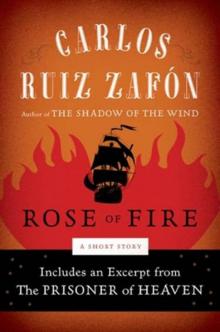 Rose of Fire
Rose of Fire